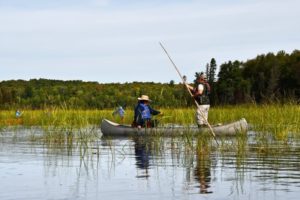As 2021 draws to a close, we wanted to share more water-related news. This month’s edition of News to Us links to articles on Great Lakes wild rice restoration, Detroit River mussel research, and Michigan water infrastructure funding. Two more articles discuss challenges with drinking water sourcing and global migration due to climate change.
Indigenous communities push to name wild rice as Michigan’s official native grain
The indigenous communities of Michigan are at the forefront of wild rice restoration across the state. Wild rice, or manoomin in the Ojibwe language, has faced devastation due to pollution, habitat degradation, damming, and climate change. Tribes and the Michigan Wild Rice Initiative are working to protect, harvest, and restore wild rice, which holds cultural significance to to Native people throughout the Great Lakes.

Researchers discover native mussels rebounding in Detroit River
Led by researchers from Central Michigan University, a new study discovered the return of native mussels in the Detroit River. Since 2019, the research team found 11 native mussel species in the Detroit River, an area with historic absent mussel populations. As discussed in a recent HRWC newsletter article, mussels provide vital ecosystem services, such as nutrient recycling and aquatic insect habitat.
Fleeing global warming? ‘Climate havens’ aren’t ready for you yet.
The Great Lakes is predicted to be one of the safest refuges amidst a changing climate. With an expected 143 million people across the globe relocating due to climate change, the Great Lakes region is likely to receive an influx of so-called climate migrants. This article from Grist discusses important planning strategies for ensuring these shifts are inclusive, equitable, and sustainable for all.
Climate change is making it harder to provide clean drinking water in farm country
The compounding effects of drought and nonpoint source runoff from agriculture are making it challenging for communities across the United States to source drinking water. More extreme precipitation events due to climate can lead to high nutrient loading into waterways. Some farmers, like in Iowa’s Racoon River watershed , are using best management practices such as buffer strips and cover crops to reduce this runoff.
Michigan Senate approves $3.3B water infrastructure bill
$3.3 billion in state water infrastructure funding was approved by the Michigan Senate in early December. The legislation provides $1 billion to replace lead service lines, $650 million for aging dam repair, and $400 million for the Great Lakes Water Authority. Also included is funding for PFAS clean up efforts and a septic system repair loan program.



